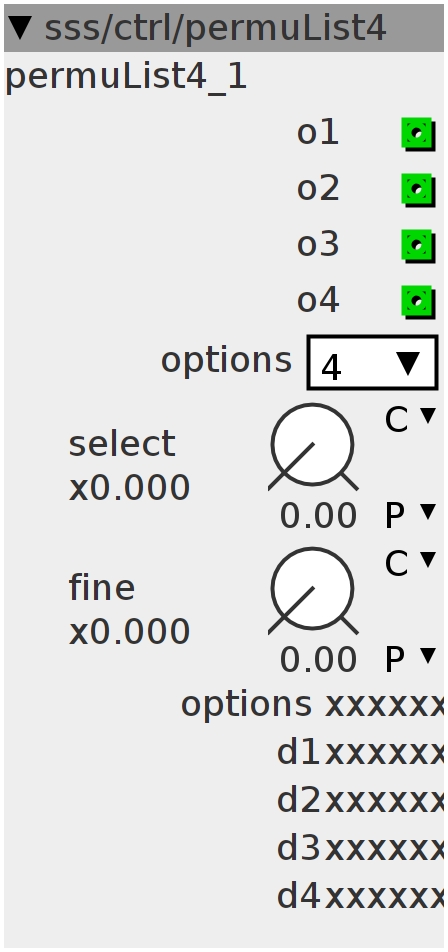permuList4
Combination module based on permutation: Creates a full list of 4-number-combinations from the available options. No repetition, no importance of order. eg: 1,2,3,4 1,2,3,5 or 3,6,8,11 (any increasing order) BUT NOT: 1,1,3,3,6 (no repetition of numbers) AND NOT: 3,1,6,5 (not smaller then any value left of itself) "select" knob is scaled to the amount of possible combinations "fine" knob can be used when using a high option count->otherwise the stepsize would be to big to select all possible combinations. The 4 outputs give you the selected indices. This module could be used for selecting 4 out of 16 functions which may not be selected twice.
Inlets
None
Outlets
int32 o1
int32 o2
int32 o3
int32 o4
Parameters
frac32.u.map.gain sets the amount of options the 4 slots can choose from
frac32.u.map.gain with high options count, you might need this knob to be able to reach all steps (eg. when using 8bit midi to control the knobs)
Attributes
combo options
Displays
int32.label options
int32.label d1
int32.label d2
int32.label d3
int32.label d4
int i;
int T[13] = {1, 5, 15, 35, 70, 126, 210, 330, 495, 715, 1001, 1365, 1820};
int options;
int32_t q = attr_options;
uint8_t *c;
// int c[attr_options<<2];static uint8_t _array[attr_options << 2] __attribute__((section(".sdram")));
c = &_array[0];
for (i = 0; i < 13; i++) {
if (T[i] == attr_options) {
options = i + 4;
}
}
for (i = 0; i < 4; i++) {
c[i] = i;
}
int j;
for (i = 1; i < q; i++) {
int k = i << 2;
for (j = 0; j < 4; j++) {
c[k + j] = c[k + j - 4];
}
c[k + 3] += 1;
while ((c[k + 3] >= options) || (c[k + 2] >= options - 1) ||
(c[k + 1] >= options - 2)) {
if (c[k + 3] >= options) {
c[k + 2] += 1;
c[k + 3] = c[k + 2] + 1;
}
if (c[k + 2] >= (options - 1)) {
c[k + 1] += 1;
c[k + 2] = c[k + 1] + 1;
c[k + 3] = c[k + 2] + 1;
}
if (c[k + 1] >= (options - 2)) {
c[k] += 1;
c[k + 1] = c[k + 0] + 1;
c[k + 2] = c[k + 1] + 1;
c[k + 3] = c[k + 2] + 1;
}
}
}disp_options = q;
int pst =
___SMMUL(((q) << 1), __USAT((uint32_t)(param_fine >> 7) + param_select, 31))
<< 2;
outlet_o1 = disp_d1 = c[pst];
outlet_o2 = disp_d2 = c[pst + 1];
outlet_o3 = disp_d3 = c[pst + 2];
outlet_o4 = disp_d4 = c[pst + 3];